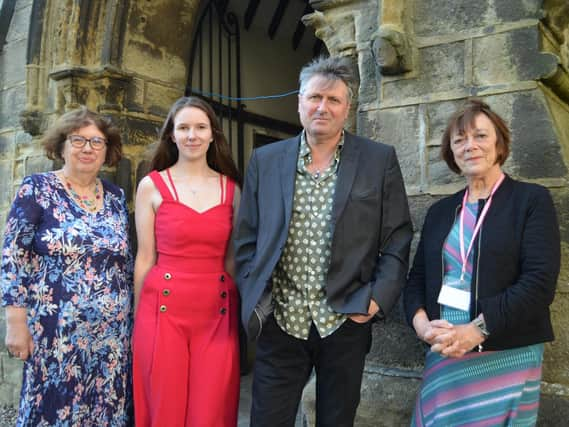Poet laureate Simon Armitage dazzles at Knaresborough event for feva festival


There was a tangible sense of excitement at Holy Trinity Church: the Poet Laureate was in town and the sell-out audience was full of anticipation for this event, postponed from last year’s cancelled feva.
Advertisement
Hide AdAdvertisement
Hide AdSimon Armitage has the perfect voice for poetry reading: clear and bell-like with a soft West Yorkshire accent, and without a trace of the portentousness of some poets.
He captivated the crowd with poems that ranged from an evocation of a teenage summer romance in Zodiac T-shirt (‘an ice-cream wept on the steps of the church’), to a moving response to the recent death of his father in The Repair Shop, imagining the craftspeople on the TV show bringing his father back to life.
He likes to explore the everyday in a fresh way: his poem To Do List is complete with bullet points. And he admitted that during lockdown he had written two poems about his Velux window.
But he also has an instinct to subvert: he reacted to the current obsession with identity with I Am Simon Armitage, a poem consisting of the many anagrams of his name, from the bizarre ‘grim anatomies’, to the comic ‘steaming Moira’, to the possibly prophetic ‘against memoir’.
Advertisement
Hide AdAdvertisement
Hide AdArmitage has been involved in many collaborations: with the Brontë Parsonage Museum, the Yorkshire Sculpture Park and the BBC among many others. One of his favourite projects was The Stanza Stones, a series of six poems engraved into rocks on a forty-mile trail from Marsden to Ilkley. He read the one titled Beck, which describes the journey of a stream until it cascades over a waterfall and ‘becomes lace’.
There was plenty of laughter too. He interspersed the poetry readings with droll anecdotes, for example, how he felt unable to sign a petition against a new cemetery near his home because the banner had spelt ‘cemetery’ wrong.
One of his students in Sheffield told him that the local Poundland store had a copy of Ezra Pound’s poetry, possibly ‘an ordering error’? This inspired Simon’s poem Poundland, written in the style of Ezra Pound’s re-telling of Odysseus’ trip to the underworld, but set in the discount store.
It includes the memorable line: ‘The duty manager with a face like Doncaster’. He said he wasn’t sure what he meant by that, but he had read it in Doncaster and it had gone down all right.
Advertisement
Hide AdAdvertisement
Hide AdHe explained that he was happy to sign books afterwards, though admitting that someone had once asked him to sign a book by Philip Larkin, so he did, inscribing it ‘All the best, Phil’.
The poetry of Simon Armitage is observant, humane and often humorous. But it can be angry too. In Thank You For Waiting he imagines the disembodied announcer at an airport inviting passengers to board the plane.
First to be summoned are First Class, Superior and Platinum members, descending through the lower ranks of Topaz and Quartz, then to the Loam and Clay classes, and then finally, ‘Sweat, Dust, Shoddy, Scurf, Faeces, Chaff, Remnant, Ash, Pus, Sludge, Clinker, Splinter and Soot: all you people are now free to board’.
This biting satire was delivered in that deceptively mellifluous voice, and hit its target with power and originality.
Advertisement
Hide AdAdvertisement
Hide AdAfter the reading Simon answered questions from the audience. These included an enquiry about his translations of medieval poetry for a modern audience. ‘It’s important to me because it democratises these works, and makes them available to all, not just scholars,’ he explained.
With his great interest in music, which song did he wish he’d written? He admired Bob Dylan as a fine songwriter, but questioned whether he was a poet. (Dylan won the Nobel Prize for Literature in 2016.) He cited Dylan’s phrase ‘the basement down the stairs’ a weak line on its own, but even banal song lyrics can be made transcendent by the addition of music.
The Poet Laureate treated the Knaresborough audience to a stimulating and entertaining evening, and he was greeted with warm appreciative applause at the end. Poetry lovers had been looking forward to this event for more than a year, and it was well worth the wait.